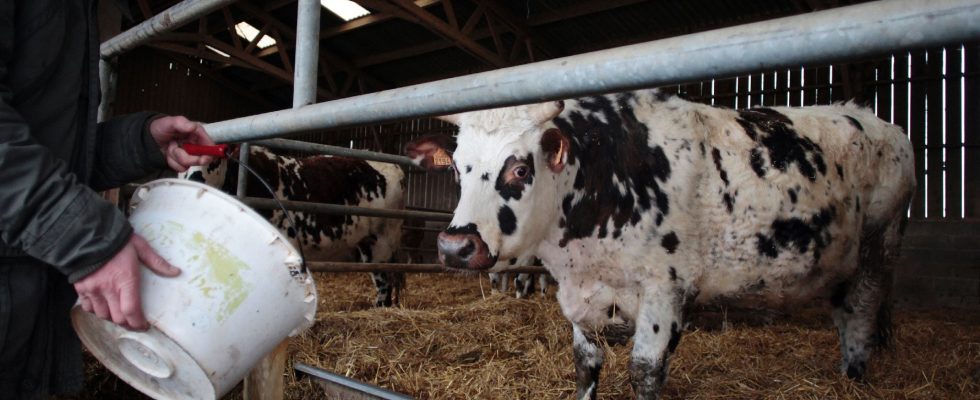Bic pen in hand, frowning eyebrows… President Emmanuel Macron took note of farmers’ grievances on Saturday February 24 at the Agricultural Show. And one day was enough for the government to pull out of its hat a big plan on breeding. The objective is threefold: to halt the decline in French livestock, reduce taxes on breeders and improve the image of meat.
Called “government plan to regain our sovereignty over livestock farming”, the document was presented this Sunday, February 25 by the Ministry of Agriculture to agricultural unions and inter-professional organizations during the Show, indicated one of the participants in this presentation to AFP. The ambition is assumed: “We must produce what we consume”.
Beyond the drop in the number of farms, “the remuneration of breeders remains generally lower than in other agricultural production despite the increase in public support, in particular from the CAP, over the past decade”, underlines the document. The preparation of a major plan intended to support livestock farming has emerged since the start of the agricultural crisis as one of the main demands of the sector’s unions.
Tax benefits and a new decree
The government, which had already presented a series of measures, is stepping on the accelerator. These include tax and social benefits worth 150 million euros for cattle farmers, a plan to provide 400 million euros in guaranteed loans to the livestock sector from July, as well as the publication of a decree, at the end of February, protecting the names used to designate foodstuffs of animal origin. Added to this is the obligation for collective restaurants to include 100% sustainable and quality products in the “meat” and “fish” families in their menus.
Another measure: an allocation of 30 million euros per year to support investment in agricultural equipment contributing to significantly reducing greenhouse gases or the release of an envelope of 15 million euros to strengthen the fight against tuberculosis. There is also the provision on the government website of communication materials explaining the positive contributions of livestock farming. Total cost of the seduction operation: 3 million euros.
Note that since 2013, meat consumption has not declined in France, but has increased by 3%, driven by chicken, according to data from FranceAgriMer. If there is a change in minds, the revolution has not yet taken hold. Regardless, the government recalls, in its plan, that the consumption of meat “must not be stigmatized”. This communication campaign will include a “reminder” that synthetic meat “does not correspond to our eating model”. At the beginning of February, Prime Minister Gabriel Attal called for “clear legislation” at European level on the definition of synthetic meat which, according to him, “does not correspond to our conception of French food”.
No decline in livestock on the horizon
Another important point: “Reducing the size of our breeding herd in France has never constituted and cannot constitute a public policy objective,” states the document. What goes against the report of the Court of Auditors published on May 22. Experts noted that for France to meet its climate commitments, it had to plan to reduce its cattle herds, which represented around 12% of its greenhouse gas emissions. The report caused an uproar in the industry.
Already, at the time, Marc Fesneau, Minister of Agriculture, had stepped up to the plate: “The discourse on forced degrowth, carried as public policy, is curious, if not out of line with reality, when we know that France does not “is self-sufficient for any animal sector. Would this mean that some people would assume that our imports would be strengthened?”
Same story in this new plan for livestock: “The reductions in emissions from the livestock sector by 2030 identified in ecological planning and which will be included in the National Low Carbon Strategy (SNBC) and in the National Strategy for Food, Nutrition and Climate (SNANC) can be achieved without reducing the size of the herd compared to 2023, by acting on other levers, such as animal feed. A risky bet.
